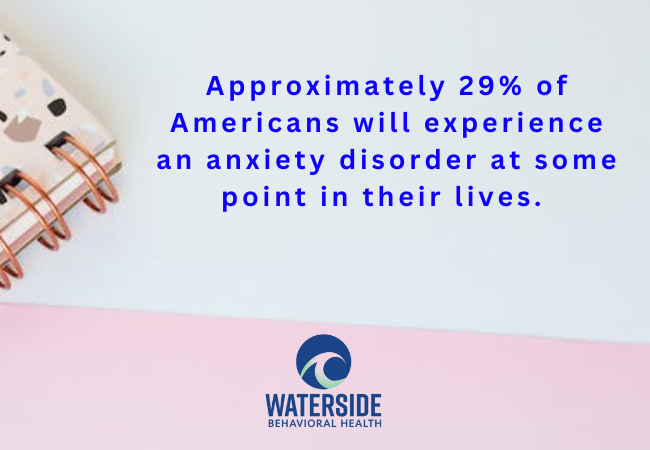Anxiety disorders are among the most prevalent mental health conditions, affecting millions of individuals worldwide. While occasional anxiety is a normal response to stress, persistent and overwhelming anxiety can interfere with daily life, relationships, and overall well-being. Fortunately, effective treatments are available to help individuals manage and overcome anxiety disorders.
At Waterside Behavioral Health, we specialize in anxiety treatment in Massachusetts, offering comprehensive, evidence-based therapies that empower individuals to regain control of their mental health. Our mental health treatment center in Massachusetts provides tailored programs, including Cognitive-Behavioral Therapy in Massachusetts, Dialectical Behavior Therapy in Massachusetts, and Trauma Therapy in Massachusetts, to address the unique needs of those struggling with anxiety.
This in-depth guide will explore the different types of anxiety disorders, their symptoms, causes, and the most effective treatment options available.
What Are Anxiety Disorders?
Anxiety disorders are a group of mental health conditions characterized by persistent, excessive fear, worry, and nervousness. Unlike normal stress responses, anxiety disorders can cause chronic distress and interfere with an individual’s ability to function in everyday life.
Types of Anxiety Disorders
- Generalized Anxiety Disorder (GAD)
- Persistent and excessive worry about various aspects of life, such as health, finances, or relationships.
- Symptoms: Restlessness, muscle tension, difficulty concentrating, and trouble sleeping.
- Panic Disorder
- Recurrent panic attacks characterized by sudden episodes of intense fear or discomfort.
- Symptoms: Rapid heartbeat, sweating, dizziness, chest pain, and shortness of breath.
- Social Anxiety Disorder (Social Phobia)
- Intense fear of social situations due to worries about embarrassment, judgment, or rejection.
- Symptoms: Blushing, sweating, difficulty speaking, nausea, and avoidance of social settings.
- Obsessive-Compulsive Disorder (OCD)
- Repetitive, unwanted thoughts (obsessions) and behaviors (compulsions) performed to relieve anxiety.
- Symptoms: Excessive handwashing, checking behaviors, intrusive thoughts, and ritualistic actions.
- Post-Traumatic Stress Disorder (PTSD)
- Develops after experiencing or witnessing a traumatic event.
- Symptoms: Flashbacks, nightmares, emotional numbness, and hypervigilance.
- Trauma therapy in Massachusetts can help individuals process and heal from PTSD.
- Specific Phobias
- Extreme fear of a specific object or situation (e.g., heights, animals, flying).
- Symptoms: Panic, avoidance behaviors, and physical distress when faced with the feared object.
Signs and Symptoms of Anxiety Disorders
While symptoms vary depending on the type of anxiety disorder, common signs include:
1. Physical Symptoms:
- Rapid heartbeat or palpitations
- Shortness of breath
- Sweating and trembling
- Dizziness or nausea
- Muscle tension and headaches
- Fatigue and insomnia
2. Emotional Symptoms:
- Persistent and excessive worry
- Restlessness and irritability
- Feelings of dread or doom
- Difficulty concentrating
- Feeling overwhelmed or powerless
3. Behavioral Symptoms:
- Avoidance of anxiety-inducing situations
- Compulsive behaviors (in OCD)
- Social withdrawal
- Increased dependence on substances (self-medicating with alcohol or drugs)
If these symptoms persist and impact daily functioning, seeking professional help from a mental health treatment program in Massachusetts is essential.
Causes and Risk Factors for Anxiety Disorders
Anxiety disorders can develop due to a combination of biological, psychological, and environmental factors, including:
1. Genetic Factors
- Family history of anxiety or mental health conditions increases susceptibility.
2. Brain Chemistry
- Imbalances in neurotransmitters like serotonin, dopamine, and norepinephrine can contribute to anxiety.
3. Trauma and Stress
- Childhood abuse, neglect, or traumatic experiences can trigger anxiety disorders.
- Trauma therapy in Massachusetts can help process unresolved trauma.
4. Personality Traits
- Perfectionism, low self-esteem, and a tendency to overthink can increase the risk of developing anxiety.
5. Medical Conditions
- Chronic illnesses, thyroid disorders, and hormonal imbalances can contribute to anxiety symptoms.
6. Substance Use and Withdrawal
- Alcohol and drug use, as well as withdrawal from substances like caffeine, nicotine, and medications, can exacerbate anxiety.
Effective Treatment Options for Anxiety Disorders
At Waterside Behavioral Health, we offer a range of evidence-based treatments to help individuals manage anxiety. Treatment plans are personalized to meet each individual’s needs and may include therapy, medication, and holistic approaches.
1. Cognitive-Behavioral Therapy (CBT)
- CBT is the gold standard for anxiety treatment. It helps individuals recognize and challenge negative thought patterns that contribute to anxiety.
- It includes exposure therapy, cognitive restructuring, and behavioral interventions.
- Offered as part of our Cognitive-Behavioral Therapy in Massachusetts program.
2. Dialectical Behavior Therapy (DBT)
- DBT focuses on emotional regulation, distress tolerance, and mindfulness techniques.
- Particularly helpful for individuals with severe anxiety and co-occurring disorders.
- Available through our Dialectical Behavior Therapy in Massachusetts services.
3. Medication Management
- Selective Serotonin Reuptake Inhibitors (SSRIs) and Benzodiazepines may be prescribed as part of a treatment plan.
- Medication is best combined with therapy for long-term success.
4. Trauma Therapy for PTSD and Anxiety
- EMDR Therapy: Helps reprocess traumatic memories.
- Exposure Therapy: Reduces fear responses by gradually confronting anxiety triggers.
- Narrative Therapy: Assists individuals in reshaping their trauma narratives.
5. Lifestyle and Holistic Approaches
- Mindfulness and Meditation: Enhances self-awareness and reduces stress.
- Exercise and Nutrition: Aids in natural anxiety reduction.
- Breathing Techniques and Yoga: Supports relaxation and emotional balance.
- Support Groups: Provides peer support and coping strategies.
How to Support a Loved One with Anxiety
If a family member or friend struggles with anxiety, offering the right support can make a significant difference.
1. Educate Yourself About Anxiety
- Learn about the different types of anxiety disorders and how they affect individuals.
2. Offer Emotional Support
- Listen without judgment and validate their feelings.
- Encourage open and honest communication.
3. Help Them Seek Professional Help
- Encourage them to explore mental health treatment programs in Massachusetts.
- Offer assistance in finding a therapist or attending appointments.
4. Be Patient and Understanding
- Recognize that anxiety is a real and challenging condition.
- Avoid minimizing their struggles or telling them to “just relax.”
5. Encourage Healthy Coping Mechanisms
- Suggest activities like exercise, meditation, and journaling.
- Avoid enabling avoidance behaviors that reinforce anxiety.

When to Seek Professional Help
If anxiety is interfering with daily life, relationships, or work, seeking professional treatment at a mental health treatment center in Massachusetts can help. The sooner an individual seeks help, the better the outcome in managing symptoms and improving overall well-being.
How to Seek Help for Anxiety
If anxiety is interfering with daily life, relationships, or work, it’s crucial to seek professional help. At Waterside Behavioral Health, we provide comprehensive mental health treatment programs in Massachusetts to help individuals find relief from anxiety disorders.
Why Choose Waterside Behavioral Health?
- Experienced mental health professionals specializing in anxiety treatment
- Personalized treatment plans tailored to individual needs
- Evidence-based therapies, including CBT, DBT, and trauma therapy
- A compassionate and supportive environment for recovery
Get Help Today
Anxiety disorders can be overwhelming, but they are highly treatable. At Waterside Behavioral Health, we offer personalized and evidence-based treatment programs to help individuals regain control of their mental health. Whether through CBT, DBT, trauma therapy, or holistic approaches, we are here to support your journey to recovery.
If you or a loved one is struggling with anxiety, contact Waterside Behavioral Health today to learn more about our comprehensive anxiety treatment in Massachusetts. Take the first step toward a healthier, calmer future. Call us today at 774.619.7750 to learn more about our anxiety treatment in Massachusetts and schedule a consultation. Take the first step toward healing and a calmer, healthier future. We’re here to help.
FAQ About Anxiety Disorders
What are the most common types of anxiety disorders?
Anxiety disorders include Generalized Anxiety Disorder (GAD), Panic Disorder, Social Anxiety Disorder, Obsessive-Compulsive Disorder (OCD), Post-Traumatic Stress Disorder (PTSD), and Specific Phobias.
How do I know if I have an anxiety disorder?
If you experience persistent worry, restlessness, difficulty concentrating, rapid heartbeat, shortness of breath, or avoidance of certain situations, you may have an anxiety disorder. Seeking a professional evaluation at a mental health treatment center in Massachusetts can provide clarity.
What causes anxiety disorders?
Anxiety disorders can develop due to a combination of genetic predisposition, brain chemistry, traumatic experiences, personality traits, medical conditions, and substance use.
What are the best treatment options for anxiety?
Effective treatments include Cognitive-Behavioral Therapy in Massachusetts (CBT), Dialectical Behavior Therapy in Massachusetts (DBT), trauma therapy, medication management, and holistic approaches like mindfulness and exercise.
Can anxiety be treated without medication?
Yes, therapy such as CBT and DBT is highly effective in managing anxiety without medication. However, some individuals benefit from a combination of therapy and medication, depending on their symptoms.
How long does anxiety treatment take?
The duration of treatment varies based on the individual. Some people experience improvement within a few months, while others may require long-term support. Our mental health treatment programs in Massachusetts offer personalized care plans for each patient.
Is therapy effective for severe anxiety?
Yes, evidence-based therapies like CBT and DBT are highly effective in treating even severe anxiety disorders. At Waterside Behavioral Health, we provide specialized therapy to help individuals regain control of their lives.




